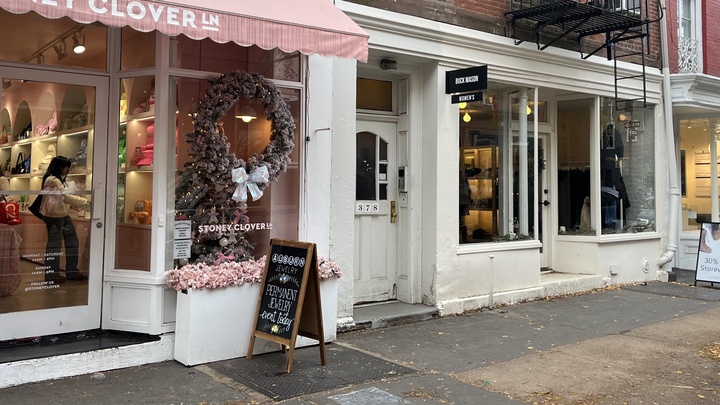New School students say they feel inadequately trained to face the rising shoplifting rates at their retail jobs in New York City.
Beatrix Shelton, a sophomore at Eugene Lang College of Liberal Arts and former sales associate at the jewelry store Mejuri in the Flatiron district has had run-ins with Organized Retail Crime (ORC) groups since she began working on Fifth Avenue five months ago. CNN defines organized retail crime, also known as ORC, as large groups of people who single out businesses with high-value merchandise and target luxury shopping areas in New York like Fifth Avenue and the Flatiron district.
Shelton described how two or more of the group members distracted her with questions about merchandise while the others pocketed everything they could. “They’ll go around and steal pretty much everything on display and leave the least valuable stuff,” Shelton said before explaining that Mejuri does not display the prices of merchandise. “I think that they do research [beforehand] and they know what stuff is most valuable.”
Upon getting hired, the only training she received in regards to shoplifting was to call the police if someone had a gun. “These big groups will come in and you don’t really know what’s going on, but you know it’s something kind of sketchy,” Shelton said.
Mejuri and other stores on Fifth Avenue commissioned a police car to drive along the street and park briefly outside their storefronts to deter shoplifters. Despite its presence, Shelton still felt vulnerable as a young woman working with no security guard and cameras that she was unsure were turned on.
Retail theft has spiked significantly in recent years specifically in major city centers. New York City has seen shoplifting rates increase by over 47% in the last two years and the leading cause is ORC, CNN reported.
Small businesses and retail conglomerates have been forced to lock up merchandise and even close storefronts across the country because of the spike in lost revenue from violent organized theft. New York Magazine reported that Target closed nine locations across four states, including New York after their stores experienced a 120% increase in shoplifting in the first half of 2023.
“Last year alone, 327 repeat offenders were responsible for 30% of the more than 22,000 retail thefts across our city,” said NYC Mayor Eric Adams in May 2023 at a press conference to announce his plan to prevent retail theft in New York City. The plan entails new programs to allow nonviolent and first-time offenders an opportunity to rehabilitate instead of being prosecuted and installing government resource kiosks in shopping centers.
The New York Post describes ORC as “boosting.” Merchandise is stolen, or boosted, by the ORC groups and then sold to dealers. Dealers resell boosted merchandise on sites like Amazon, eBay, and Facebook while the ORC groups keep 10-20% of the profits for themselves.
Most commonly, a group distracts an employee while another individual in the group acquires the desired products, or they boost large quantities of merchandise at one time if there is no security guard to stop them.
“It’s scary,” said Natalie Nuehoff, manager of the Ganni retail store on Bleecker Street. Nuehoff has had dozens of run-ins with ORC groups stealing t-shirts, sunglasses, and sweaters collectively worth thousands of dollars. She mentioned encounters she’s had in the past three months with perpetrators who were loud and aggressive. Nuehoff felt insufficiently protected by her higher-ups who had refused her requests for a security guard. She was told that “the cost of theft would have to go up to a certain point to where the cost of hiring a daily security guard would meet that.”
Recently, ORC groups have become increasingly aggressive and violent, not caring if they are noticed by retail workers. “People coming in with ski masks, grabbing as much as they could, smashing shit,” Nuehoff said, referring to a KTLA 5 News video of a Nordstrom in Southern California. “I just kind of worry about that happening here … [theft] by force, not just a cheeky, ‘look over there’ situation.”
Jess Tenhoeve, a senior at Parsons School of Design, works at 2nd Street, a second-hand store where people can buy and sell luxury goods. They have five locations across New York. She has worked at the Lower East Side location for the past three months, witnessing security guards intercept shoplifters frequently. However, other 2nd Street locations in New York have faced more violent confrontations.
“I’ve heard of people coming into our other stores and smashing the glass shell cases,” Tenhoeve said. The guards are trained to identify suspicious behavior, like customers carrying large bags, covering their faces, and moving irregularly, but a large group of potentially violent shoplifters can overwhelm them.
To try and remedy some of the theft, 2nd Street requires that you check any large bags at the front door. The attendant hands you a number like a coat check and customers can pick up their bags on the way out.
ORC group strategies typically involve reselling stolen merchandise as quickly as possible. Tenhoeve said that 2nd Street has encountered people selling merchandise at one location that was thought to be stolen from another. These sellers get banned from all 2nd Street stores, and it is the job of the security guards to remember their faces.
While retail theft rates rise and employees feel powerless against it, many fear for their safety when up against organized crime rings.
As of Oct. 12, Shelton has quit her job at Mejuri and feels like her former workplace lacks sufficient employee protection.
“There needs to be a larger reckoning within the corporate companies to do better,” Shelton said. “No employee wants to be put in a situation where they’re fearing for their life or getting into a physical altercation over a $40 ring. It’s not worth it.”








Leave a Reply